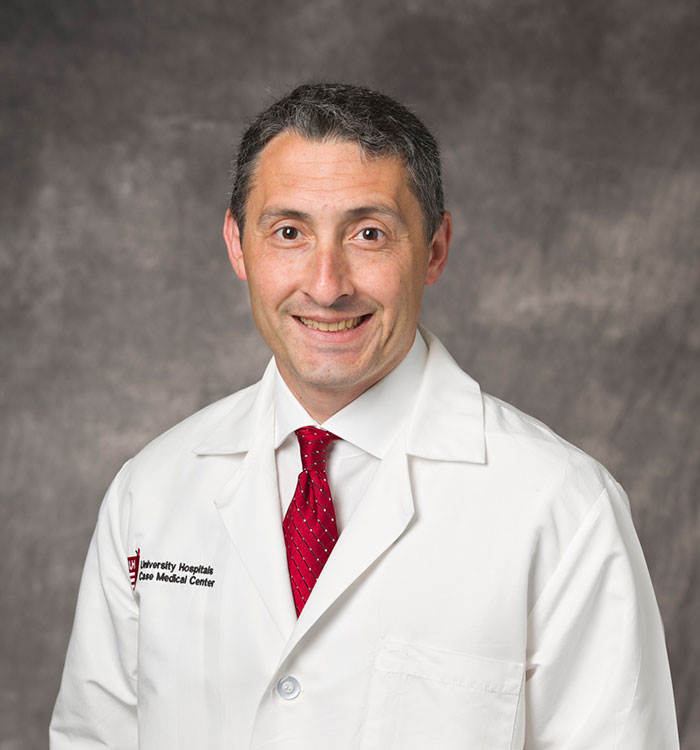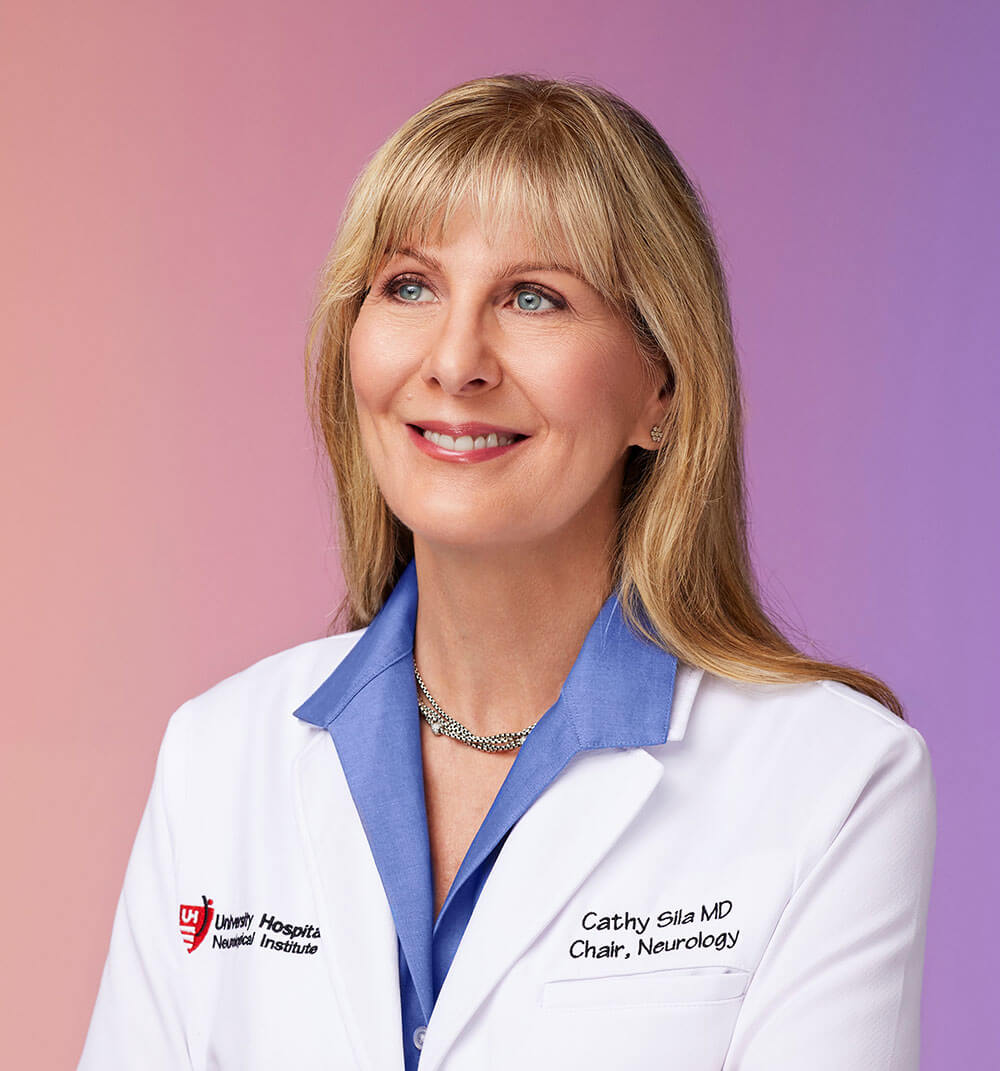University Hospitals Neurological Institute Helps Patients Continue Critical Treatment During Coronavirus Pandemic
July 13, 2020
A safe space for patients
Innovations in Neurology & Neurosurgery | Summer 2020
 Nicholas Bambakidis, MD
Nicholas Bambakidis, MD Cathy Sila, MD
Cathy Sila, MDThe feared surge of COVID-19 patients did not arrive at University Hospitals Cleveland Medical Center this spring. But leaders at University Hospitals’ Neurological Institute are managing through other consequences of the pandemic — specifically, patients who are delaying care for neurological conditions.
“We’re only now starting to see patients who are coming in for delayed diagnosis of brain tumors, strokes and other concerns,” says Nicholas Bambakidis, MD, Director and Vice President of UH Neurological Institute, and Professor of Neurological Surgery, Case Western Reserve University School of Medicine. “We’ve seen our volume of emergency stroke cases drop significantly, not just here, but at hospital systems around the country.”
The same is true for individuals who require follow-up visits for chronic neurological conditions or who are having potentially life-threatening symptoms, he says. “People are afraid to call their doctor. They’re afraid to call 911. They may be dying of strokes and heart attacks at home and not getting treated or not getting treatment in a timely fashion.”
Here are several ways UH Neurological Institute has prepared for the impact of COVID-19 while ensuring neuro patients get the care they need.
PATIENT AND STAFF SAFETY
Since early March, the Institute has worked closely with hospital leadership to identify neurology and neurosurgery physicians to help care for COVID-19 patients. They’ve also created new protocols to keep active physicians, staff and resident trainees safe at work.
Per the Governor’s orders in mid-March, UH neurosurgeons and neurologists ceased elective procedures and surgical cases during this period. Administrative staff was shifted to work-from-home duties, and call schedules were revised to give physicians and residents adequate days at home while maintaining staffing levels for emergency cases.
Investments in research efforts and continuing education improved morale while patient volume was lower.
“We had trainees involved in daily education conferences virtually and also refocused them on research aspects of their specialties, so that they would continue to learn and be connected to their colleagues in the hospital,” Dr. Bambakidis says. “Maintaining that kind of activity was very important.”
Like other specialties, the Institute also transitioned many outpatient appointments to virtual platforms — providing new pathways for neurological care.
“We already had a pretty active virtual services offering in neurology,” explains Cathy Sila, MD, FAAN, FAHA, Chair, Department of Neurology at UH Cleveland Medical Center, and Professor of Neurology, School of Medicine. “So we were already coming up with protocols about which patients could be managed with virtual services — and the limitations. Within four days, we put in place what we’d been working on for years.”
In addition to the Institute’s long-running telestroke, teleneurology and telesleep programs, physicians began using platforms such as Doxy.me, Zoom and Cisco Jabber, among others, to serve a broader range of patients via mobile app, computer and even by phone.
Through a mix of in-office and virtual visits, the Institute has now surpassed its typical daily visit volume.
“There were so many patients and families who were thrilled to have these personal conversations with their care providers, address issues with their medications or have a conversation about their diagnosis or their treatment plan,” Dr. Sila says, noting the many patients who are disabled by their neurologic conditions or restricted from movement during treatment. Physicians must address these and other considerations as part of a larger shift toward virtual care.
For example, the Institute’s Brian Appleby, MD, Neuropsychiatrist, UH Cleveland Medical Center, and Associate Professor of Neurology, Psychiatry, and Pathology, School of Medicine, is leading a research project to evaluate patients with rapid dementia through telemedicine. His findings have already helped modify certain procedures so that they can be done more accurately using virtual platforms.
“What we’re learning is that although virtual visits are similar in many ways, there are nuances to them – ways to do parts of the examination that make it highly accurate over a video that is different than what you might do in an office,” Dr. Sila says, citing the challenges of performing a cognitive assessment or sensory examination virtually. “These are improvements that we’re continuing to make because virtual visits are a huge benefit to the patient.”
PLANNING FOR THE FUTURE
A resurgence of coronavirus in the fall or winter remains a concern, Dr. Bambakidis says, but UH has laid the groundwork to respond swiftly. “We’ve learned a lot about how to take care of these patients and what interventions working in slowing down the spread of the disease,” he says. “The bigger issues will be managing the fallout of the economic consequences, the patient fear, the ramifications of people delaying their care and what that will look like going forward.”
Communication about hospital safety measures, including mandatory masking, temperature checks and a strict visitor policy, may help patients feel safer and avoid delaying their care in the meantime.
“We’re cleaning the exam rooms, cleaning the hospital and the operating rooms, and being extremely cognizant of the health issues,” Dr. Bambakidis says. “I like to tell patients, ‘It may be riskier to run your errands and go to the grocery store than to come to the hospital, because of the precautions we’re taking.’”
For more information or to refer a patient, call 216-553-1778.


